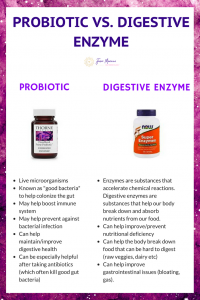The difference between Probiotics and Digestive Enzymes.
What is a digestive enzyme & what is a digestive enzyme supplement?
Before we dive in to what exactly a digestive enzyme is, let's first define what an enzyme is. Enzymes are substances that accelerate or assist a biochemical reaction.Digestive enzymes are substances that act as a catalyst in the digestive process. It's important to note that our body produces digestive enzymes all on it's own. For example trypsin is an enzyme that aids in protein digestion, lipase is an enzyme that aids in fat digestion, and amylase aids in carbohydrate digestion.A digestive enzyme supplement contains a concentrated amount of these enzymes that naturally occur in the body. If all is functioning well, a person may not need to use a supplement, however, if you find that you are dealing with uncomfortable bloating, belching, gas or extreme fullness despite not eating much, a digestive enzyme might be able to help.It's also important to note that if you do not have a gallbladder (like me!), it is important to discuss with your healthcare professional about taking fat digestion support. People without gallbladders likely have compromised fat digestion - this is actually something I learned a while back when I had blood work done and came up low on essential fatty acids despite the fact that I was eating a high fat diet. It turned out that even though I was eating a high fat diet, my body was not absorbing and using the nutrients - when I added digestive support, my fatty acid level went up to normal. So cool!(*Please check with your health care practitioner before using any supplements)
Some of my favorite digestive enzyme products are:
- Now Digestive Enzyme
- Biotics Beta Plus - GREAT for those without gallbladders
- Biotics Beta TPC
What is a probiotic & what is a probiotic supplement?
It seems that "gut health" is all the rage these days and it's not without merit. Scientists are learning more and more just how connected our gut is to other systems in the body like brain function & the immune system.You see, our gut is home to billions of bacteria - some of it good, some of it "bad".If the gut micro biome is out of whack, we can set ourselves up for illness, gut dysfunction, infection and a host of other problems. Therefore, it's important to be cognizant of the fact that we should be giving our bodies adequate amounts of good bacteria.We can get "good" bacteria from fermented foods like yogurt, kimchi and sauerkraut - we can also get it from taking a good quality probiotic.Some of my favorite probiotics are:
Probiotics vs. Digestive Enzymes
As you can see, there is a big difference between probiotics and digestive enzymes. Probiotics are really meant to colonize the gut flora with good bacteria, and digestive enzymes are more for assisting in the digestion and assimilation process. It's important to reiterate the fact that supplements are NOT always necessary - but they can be helpful on your journey to health. Always check with your healthcare professional before adding in any new supplementation.

